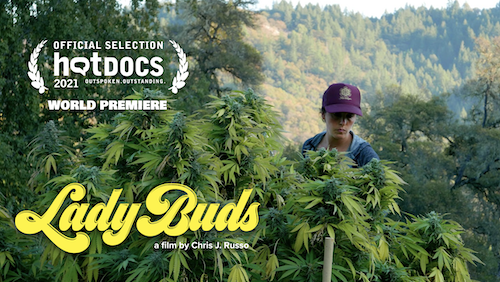
Photo credit: Lady Buds Movie.com
In November 2016, more than 50 million Americans welcomed adult-use cannabis as voters in Maine, Massachusetts, Nevada and California approved recreational weed.
All eyes were on California, the world’s fifth largest economy, and home to the largest consumer market in the U.S. Here, voters approved Proposition 64, which legalized possession and set forth regulations for the statewide adult-use market.
There was now a legal route for possessing, producing and selling cannabis for adults 21 and over in California. Not only did the newly passed policy promise access, but a flourishing, multi-billion dollar market that would prioritize small businesses.
But, optimism turned to fear as Californians started to witness “a corporate takeover” of their cannabis industry, says Chris Russo, award-winning LGBTQIA+ filmmaker whose works include A Woman Reported, Size ‘em Up, and Lady Buds.
Post from @lady.buds on Instagram
Her latest film, Lady Buds, follows six women as they come out of the shadows and into the light of the legal market.
Lady Buds premiered in Canada in early 2021; and previewed at Outfest L.A. the August. It’s California release is set for this October at the Mill Valley Film Festival. It is described as “ambitious” by The Hollywood Reporter, and an “upbeat doc that introduces [six] women who have been sticking it to the man for years,” says Point of View Magazine.
Post from @lady.buds on Instagram
Those women and their communities are the backbone of the cannabis movement in California, Russo explains. But, as the film illustrates, they are fighting to remain in an industry they helped build, and for their “piece of the American dream,” Russo adds.
Women Transforming Cannabis
On a rare rainy day in L.A., Russo reflects on her filmmaking journey, which took nearly five years and almost 500 hours of footage.
Russo’s relationship with cannabis began when she was a teenager, she tells Emerald. As a self-described outlier, she says, “I have always identified with the counterculture movement.”
When she saw Prop. 64 on the ballot back in 2016, it struck her interest, she explains. “I knew there was going to be [a siege] with California as the fifth largest economy in the world.”
But what caught her attention most was the amount of women in the cannabis industry. “I was pleasantly surprised that there were so many women entrepreneurs, cultivators and activists,” Russo adds. “We are used to this bro culture, […] it was great to see women transforming cannabis into wellness products, and advocating [for cannabis] as medicine.”
Post from @lady.buds on Instagram
Throughout her filmmaking journey, Russo and her team interviewed several women in California and Colorado. The six featured most prominently in the film are legacy cannabis farmers Chiah Rodriques, Karyn Wagner and The Bud Sisters; entrepreneur Sue Taylor; and LGBTQIA+ activist Felicia Carbajal.
Lady Buds covers a broad range of experiences. But from raising children on a weed farm, to opening a dispensary, to lobbying lawmakers — there is commonality in each woman’s struggle to find their place in an industry now dominated by white male, corporate interests.
Post from @lady.buds on Instagram
The Consequences of Legalization
Chiah Rodriques is a second generation cannabis cultivator and co-founder of Mendocino Generations, an alliance of legal cannabis farms.
As a small operator with the urge to take the legal route when possible, she tells Emerald, she was optimistic about Prop. 64.
“But now I feel like a jerk for voting for it […],” she says. “That law is terrible, in a million ways for farmers and consumers.”
The reason for her change of heart unfolds in Lady Buds, and in turn, puts a spotlight on Prop. 64’s failed promises to California voters.
“In Prop. 64, there were some promises made that the people in Sacramento turned their back on and changed,” Russo explains.
Consequently, small operators were left to fend for themselves against everything from wildfires, to local bureaucracy, to corporate greed.
Restorative Justice
Despite barriers to entry, the women in the film are leading the charge to ensure that those most affected by the War on Drugs have a seat at the table.
Take Former Catholic school principal turned canna-preneur, Sue Taylor, for example.
Post from @lady.buds on Instagram
Lady Buds also follows Taylor’s efforts to enter the legal industry, and open the first Black-owned dispensary for seniors in the Bay Area city of Berkeley, California.
“As an African-American businesswoman in a white and male-dominated industry, Sue pushes forward despite financial concerns, repeated delays and the frustrations of dealing with local bureaucracy,” according to the film’s website.
Then there is Felicia Carbajal, an LGBTQIA+ and Latinx activist and builder of social movements, who, as Lady Buds also describes, is “determined to help bring social and restorative justice to those affected by the War on Drugs, [and hold] new cannabis industry players and policy makers accountable in Los Angeles and throughout the industry.”
Post from @lady.buds on Instagram
“The Bug Guys vs. the Little Women”
While the film explores the struggles that women in the industry face post-Prop. 64, it also showcases the positives of legalization: the ability to come out of the shadows.
“That was this phrase I heard quite a bit: coming out of the shadows […],” Russo says.
“A lot of these people were running from helicopters back in the day. They couldn’t really live their lives out in the open,” she adds. “As a career filmmaker, that phrase really struck me; they wanted to live their own authentic life out in the open, and not hide anymore.”
Stepping into the light is an overarching theme in the documentary, explains Rodriques, second generation cannabis farmer. But, she adds, it’s mainly about “the big guys versus the little women. These women [are] trying to do their thing, and do what they know is right in their heart.”
Reporting by Lelah Byron and Melissa Hutsell


 (@lady.buds)
(@lady.buds)
Leave a Reply